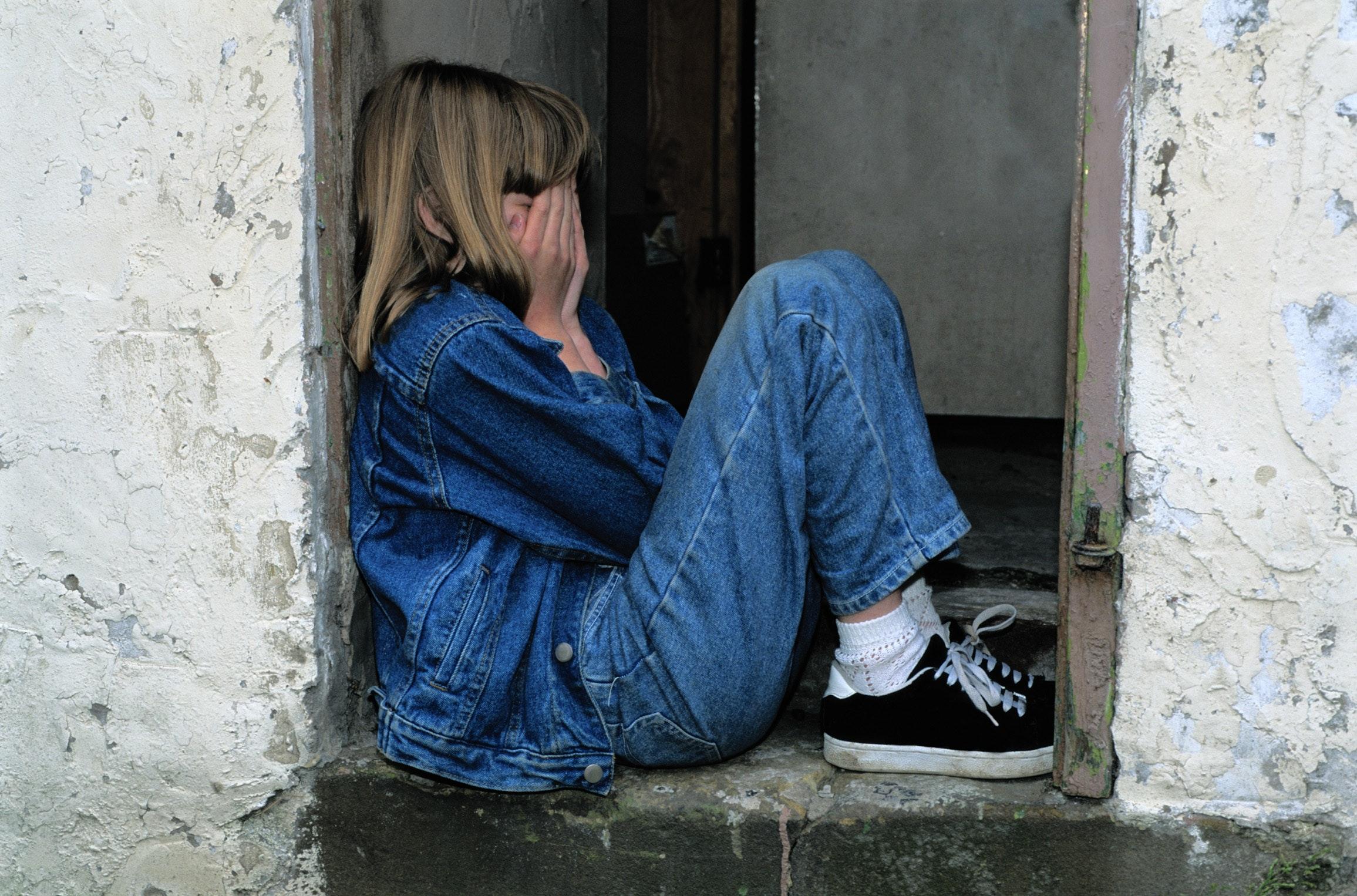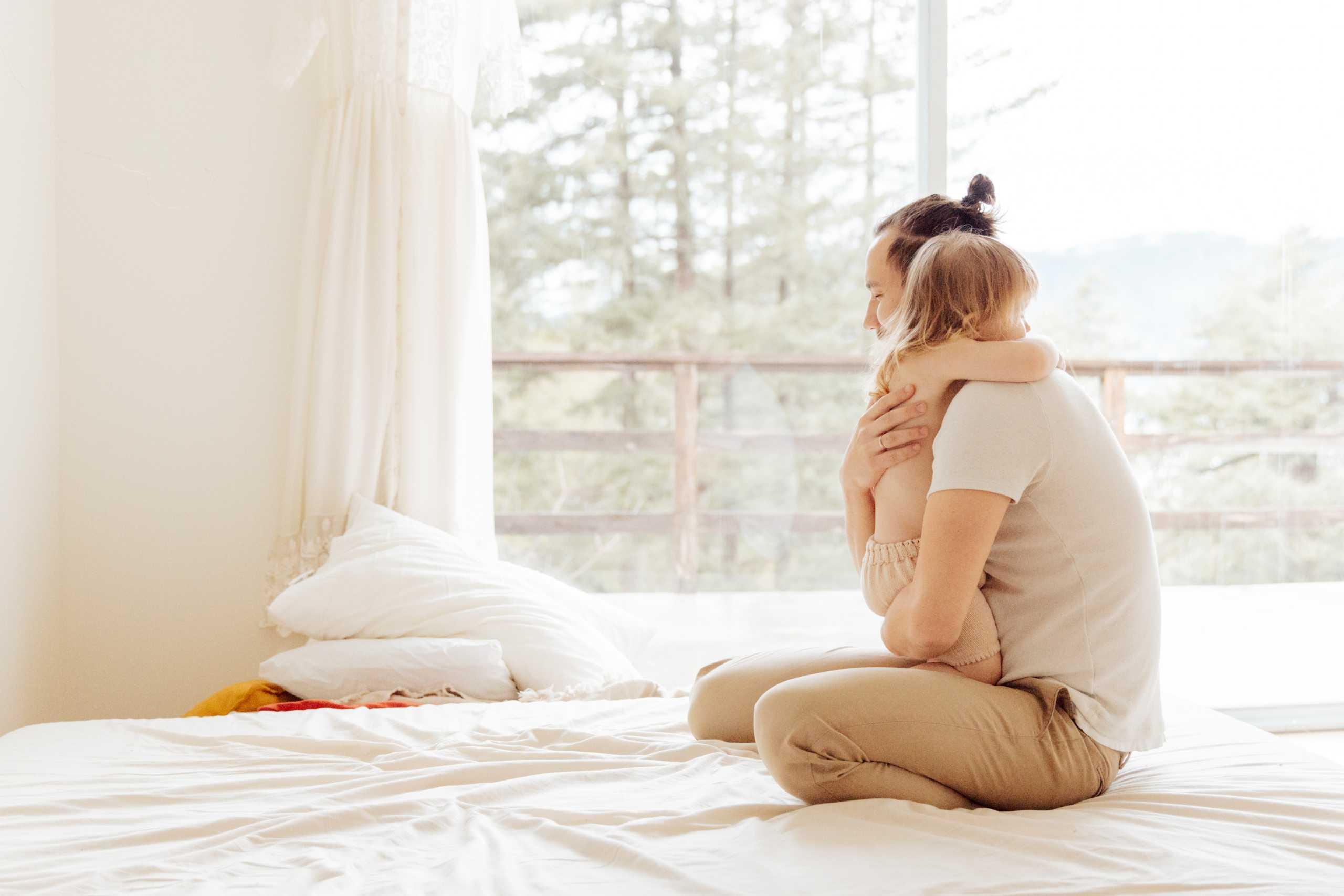Like most of the people I know, I grew up in a household where physical discipline of children was normal, accepted, and expected. I’m not about to dive into how that impacts me today, but I am going to dive right into my parenting journey — because I think it’s important to hear both perspectives.
Because physical discipline and an authoritarian parenting style was my norm as a kid, I thought this *must* be the best way to parent my own children. Of course, I didn’t have a name for the “way” I was brought up at that time; I just thought it was the same as everyone else. And perhaps it was – I don’t really know. But I, like most new parents, started with what I knew.
As my toddler began to have opinions and push limits, I found my patience wearing thin. Two years old was a hell of a lot different than a six month old, and I had zero idea of how to regulate my own emotions, let alone those of another person. I felt my anger simmering right at the surface, all day, everyday, just one wrong move away from boiling over. I hated the way I felt, I hated how angry I could get at a child, and I hated how that anger would turn into physically disciplining her.
Spanking her never seemed to work. She would just cry even more, listen even less, and I felt absolutely numb during and after the punishment. Wasn’t this supposed to work? Wasn’t she supposed to learn that if she doesn’t listen, this is what happens? And if she doesn’t want this to happen, then she should listen?
One night, after a very hard day with her, I sat with those thoughts in the quiet of my living room. If she doesn’t listen, this is what happens.
I nearly vomited when I realized what that sounded like.
I sobbed a gut-wrenching cry. That day, I had tried time-out in an effort to not spank her. But every time I put her in the corner for time out, she would scream and run to me, crying, confusion and hurt on her sweet little face. And rather than scoop her up and comfort her, I rejected her, and spanked her. I had hated every moment of it. My body was having a physical response to my own actions. What have I done? What am I doing?

Over the next two years, my husband and I managed to reserve spanking for only very serious offenses. We still yelled quite a bit–that also bothered me–but we had made progress. I was happier and so were the kids, for the most part. But still, even the threat of spanking my children didn’t sit right with me. It took me a while, but eventually, it dawned on me:
They’re not listening because they want to. They’re not listening to us because they love and respect us. They’re listening to us because they don’t want to get hit. They’re listening because they’re afraid of us.
Whoa. Yeah, I know, that last bit is going to trigger some people. If those sentences really grind your gears, sit with it. Really feel those emotions that are dumping adrenaline into your system right now. And then ask yourself, “Why am I having such a strong reaction to this?”
While you’re doing that, I’ll continue.
I voiced my revelation to my husband. He immediately agreed – he came from a household with zero physical discipline; so he had just followed my lead when it came to spanking. It was easy to convince him to drastically change our parenting style; implementing it, however, was much more difficult.
It still takes so much work from us both — but we’re doing it. It started off really, really poorly, to be honest. A lot of screaming, threatening, and spanking continued for some time. I had to learn to walk away. I had to learn to go outside and calm myself down before dealing with my children. I began seeing a trauma specialist for therapy and learned many, many self-regulating techniques that all of us use to this day, such as tapping, slow and deliberate eye movement in a back and forth motion, and my kids’ favorite: blowing out birthday candles. The last one involves holding up five fingers and telling your child to “blow” them out one by one, which regulates both of your breathing.
After we are all regulated, we talk. Yes, that’s really all we do. Communicate. A child screaming and/or crying has a need that isn’t being met, and this is the best way they know how to say it – by crying, or rebelling, or yelling. It is my job as their mother to teach them how to communicate, how to regulate, and to identify and meet that need. I can’t do any of that if we are both screaming, both breaking down emotionally, and both resort to physically hurting another person.

I don’t read many parenting-technique books, so how I got to this point in my parenting journey really just involved me doing a lot of introspection. I spent many, many nights thinking about how bad I felt, how bad my baby felt, and how I felt helpless to change it, even though I am her mother. I began to remember how it felt to be so small, so confused, and so afraid. And so began what I refer to as my “parenting logic.”
All “parenting logic” is are my random thoughts about how we as a society treat children, and how little it makes sense. I’m not sure how else to write this, so here are some of my thoughts in bullet points:
- If I were at work and my employee refused to cooperate, is it acceptable to scream at them in front of everyone? To scream at them at all? To smack them? To threaten to smack them? No. That would be a huge HR problem, assault, and I’d (rightfully so) lose my job. So why is it acceptable to scream in a child’s face, threaten to hurt them, and then hurt them? The only difference between these two scenarios is in one, the fight is somewhat fair, and in the other, one party is completely defenseless.
- Why do we tell our children to “keep their hands to themselves” and “do not push/hit” whenever they become frustrated or angry and shove another child, but when we get frustrated by our children, it’s acceptable to spank them? This a very conflicting message, and it is unfair, as it holds my child to one standard, but myself to another.
- Why do we reprimand our children for their big emotions by saying things like, “calm down,” “there’s nothing to cry about,” “big girls/boys don’t cry,” “don’t you raise your voice at me,” while simultaneously making our impatience and frustration with them immediately clear by raising our voices, rolling our eyes, or even crying? How can we expect our children, whose frontal lobes aren’t anywhere close to being developed, to control their emotions when we can’t even control our own?
- Why do we send our children away to their rooms when they get stuck in a crying or yelling spell? Would I send my spouse away from me if he came to me full of emotion, unable to calm himself down? No. I would ask him what’s wrong, how can I help, what does he need? Can I hug him? Can I get him something comforting? Can I take over a task if he’s overwhelmed? Can I make him a snack? Does he need sleep? I wouldn’t think of sending my grown, adult husband away from me in a moment when he clearly needs support–so I stopped doing this to my kids. If they need a moment to themselves, I support and encourage that, but I will never make them in a moment of distress.
- As parents, aren’t we supposed to be nurturing? Protective? Safe? I think so. Would I feel nurtured, protected, safe in the presence of someone who hits me when they’re frustrated or angry, or whenever I make a mistake? Never.
- Due to my personal history of abusive relationships, this one was particularly loud in my head: I never want my children to think love looks like that, because it doesn’t. If my spouse hit me when I made a mistake or refused to obey him, everyone would be horrified, wouldn’t they?
I have some more thoughts, but I think that’s plenty for one post. It’s all a bit heavy, I know. But the work is worth it, it is possible to change your parenting style, and it’s okay to do things differently than how you were raised. In fact, I think it’s encouraged these days.
One day during the year that we had decided to really commit to changing, our oldest had a meltdown. She was four, almost five at the time. It had been nearly a year since we spanked anyone. During the scene, she went to run away from her father and I, but the baby was right by her feet. My husband reached his hand out in an effort to gently stop her from hurting her sister and herself, but instead of doing that, our daughter flinched. She had stopped mid-run.
My heart broke.
I got down to her level, held her hands, and said,
“Baby, do you remember the last time we spanked you?”
She nodded, “It was a long time ago.”
“Yes, it was. And I need you to hear me. Daddy was trying to stop you from hurting your sister and yourself, he wasn’t going to grab you or spank you. Is that what you thought was happening?”
She nodded again.
“We are never going to spank you or your sisters again. You don’t ever have to worry about that. I am so, so sorry we ever spanked you. You see, when I was little, it was normal and okay for grown-ups to spank their kids. Almost everyone before Daddy and I did it. But now, we are learning, and we know it isn’t okay. We didn’t know better before, but we do now, and it’s not going to happen again, okay?”

She literally threw her entire little body at mine, her arms clasped around my neck so tightly, sobbing into my shoulder. I cried, too. Then I asked her, “Do you forgive me? I am so sorry, and I love you so much!”
She nodded, and whispered “Thank you, Momma,” into my ear. Her and her daddy had a similar, emotional exchange.
It’s been nearly two years since that conversation. Our youngest has never been spanked, and our middle child received a handful of spankings before we changed our parenting style. Our oldest, obviously, got the most of it, and we are still working on changing and mending that relationship, and it gets better every day.
Our house is now peaceful. Yelling is kept for emergencies only, with a few exceptions here and there because of course, we are human. Our children cooperate more than they ever have before, and we all respect one another. One of the phrases I use when disciplining my kids is, “Do I speak to you that way? Do I hit you?”
And the answer is, truthfully, “No.”
What joy that brings me!
If my “parenting logic” isn’t your jam, here are some studies on spanking and child development:
The Effect of Spanking On the Brain
The Research on Spanking and Its Implications for Intervention
The American Academy Of Pediatrics On Spanking Children: Don’t Do It, Ever.

















Thank you for your honesty in this post! I have been struggling with this for a few years now. I was raised just as your were & everyone in the family has an opinion on how I should be disciplining my son & daughter. How can I teach my children it’s not ok to hit people then turn around and do it to them?! I find comfort in knowing I’m not the only mom going through this exact same thing with her children.
Wow. Thank you for your honesty and bravery in writing this story. I’ve read a few things from you, but this had me in tears. My son has also received only a few/hand full of spankings in his five years. My husband and I have had many conversations about it, and like you we reserved it for very serious offenses. And every single time- i feel like something is just not ok about doing this. I know he is just a child. And you really just confirmed that for me. Thank you for this really.